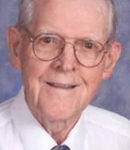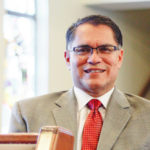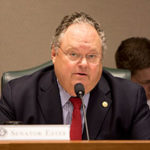Bill Ellis was president of Howard Payne University from 2009–2018, and now serves as chancellor. From deep in the heart of one Texan, he shares his background and thoughts on leading that BGCT school. To suggest a Baptist General Convention of Texas-affiliated leader to be featured in this column, or to apply to be featured yourself, click here.
Background
Where else have you worked, and what your positions?
- 2001–2009: provost and chief academic officer, Hardin-Simmons University
- 1990–2001: professor of English, dean of arts and sciences, Ouachita Baptist University, Arkadelphia, Ark.
- 1987–1990: director, associate professor, director of graduate studies in English, Mississippi College, Clinton, Miss.
- 1985–1987: assistant professor of literature, Louisiana College, Pineville, La.
Where did you grow up?
Abilene, TX
How did you come to faith in Christ?
Being reared in a devout, Christian home, my coming to faith occurred in a natural and very undramatic way. My profession of faith was emotional and profound at the age of six. I went forward during the invitation at a revival service, which my father was leading, and I have never questioned the reality of that salvation experience. Of course, my growth in my understanding of what that event meant continued as I matured, and it continues to this day.
Where were you educated, and what degrees did you receive?
- BA, English and History, Hardin-Simmons University
- MA, American Literature, Texas Tech University
- D., American Literature, University of Colorado, Boulder
- additional graduate studies, Southwestern Baptist Theological Seminary
Ministry/Profession
Why do you feel called to your particular vocation?
Growing up with a father, who was a professor and administrator at HSU for his entire professional career, and coming from a long line of teachers and ministers, the only decision I had to make was what I wanted to teach, not whether I would teach.
I considered theology and history but settled on literature and creative writing because I saw the importance and wonder of narrative and story as central to the revelation of truth. While at their core, theology and history also centered in narrative, I was drawn to literature because I realized that stories can communicate human and divine truths we are hard-pressed to articulate directly (e.g., the parables of Christ).
Early on in my academic career, I found I enjoyed administrative work, and I have accepted opportunities to move into higher education administration as the Lord has opened doors. I thank God for Howard Payne University and the blessing he has given me by allowing me to serve in this remarkable institution.
Please tell us about your BGCT institution—the breadth and nature of its work, including its mission, measures of scope, etc.
Established in 1889, Howard Payne University is a comprehensive, liberal arts institution. That means we offer undergraduate and graduate degrees, and at the heart of our curriculum is a traditional academic course of study which is broadly based, is required for all undergraduate degrees, and consists of various courses from across the disciplines (i.e., theology, history, math, writing and literature, science, etc.). HPU has about 100 majors and minors, including professional degrees in subjects, such as business, education, pre-law and pre-med.
Our mission is to provide students with a “Christ-centered academic community dedicated to excellence by developing and equipping the whole person for intellectual inquiry, personal and professional integrity, and service to God and humanity.” We believe all truth is of God, and we believe in the value of every person as God’s creation. Finally, our vision for HPU is to strive continually to be a premier Christian university that intentionally engages the life of the mind and the life of the spirit.
What do you like best about leading your institution? Why?
What I love best about being a part of Howard Payne University is the people—the students, the faculty and staff, the alumni, and the many friends of the institution.
Sign up for our weekly edition and get all our headlines in your inbox on Thursdays
Every Baptist university has great students and great employees, but HPU is unusual in my experience. Part of our uniqueness results from our being “off the interstate” and in a smaller city. As a result of our location and the culture of the campus, students who attend HPU have intentionally chosen to come to our smaller, more intimate community.
When asking students “why did you choose HPU,” I most often hear, “God led me here.” When I talk to our graduates, I most often hear them say, “HPU changed my life.” In other words, HPU is a place that is more than the degrees we deliver to our students; it’s a place where lives and hearts are changed.
Further, our faculty and staff members consider their work at HPU to be more than a job. They use words like “ministry” and “calling.” While many universities describe themselves as a family, you only have to come onto the campus of HPU to feel and know we are a real family.
What aspect(s) of your institution and/or its mission do you wish more people understood?
HPU has long been known for graduating exceptional ministers and teachers, and that is still true today. For example, we have a disproportionately large number of graduates serving within the BGCT. Further, we have the only masters in youth ministry degree in the state.
Our 52-year-old Guy D. Newman Honors Academy is the most challenging and rewarding honors program I have seen in my professional experience, and I have been involved with numerous honors programs at other institutions.
The HPU pre-law and pre-med programs graduates are usually admitted to the law school or medical school of first choice.
Howard Payne also has a long record of serving Hispanic students, having representatives of our university present at the creation of the Hispanic Baptist Convención of Texas. Finally, we are in the process of developing a campus in New Braunfels and growing our presence in El Paso, where we have offered degrees for over 25 years.
How has your institution and its mission changed since you began your career?
The mission of Howard Payne University has not changed. However, we have expanded our degree offerings by adding six new graduate programs and several new undergraduate programs, including engineering, athletic training and forensics.
How do you expect your institution and/or its mission to change in the next 10 to 20 years?
We will remain true to the original vision of our founders to provide Texas with high quality, comprehensive higher education that is centered in our faith and service to Jesus Christ.
Name the three most significant challenges and/or influences facing your institution.
Our rural location is both challenging and a blessing. It is difficult to attract students from metropolitan areas to rural Texas. However, those prospective students who visit our campus often recognize the enormous advantage in attending a smaller university with small classes and a faculty to student ratio of 1 to 10.
Christian universities are caught at the forefront of our nation’s “culture wars.” Finally, our financial margins are very thin and have been steadily shrinking as the economy continues to struggle. Not only do costs continue to rise, but our external financial supports are shrinking, including that of the BGCT.
What one aspect of your job gives you the greatest joy or fulfillment?
It is a privilege and blessing to serve with godly, dedicated faculty and staff at an institution which is not ambiguous in its commitment to serve Christ and his kingdom by providing the highest quality education to the next generation of leaders.
About Baptists
What are the key issues facing Baptists?
As financial challenges continue, the BGCT must identify and prioritize the basic interests of our cooperating Baptist churches. I would make the argument that for the longevity and health of Texas Baptist churches, in terms of ministers and leadership, the important role of our explicitly Baptist universities is of utmost importance.
About Bill
Who were/are your mentors, and how did/do they influence you?
I grew up in First Baptist Church in Abilene, listening to James Flamming, who along with my father, shaped my values and theology. There are numerous Christian professors who shaped my teaching and commitment to Christian education. I have served in churches with fellow teachers, deacons and ministers who have walked as examples before me of men and women of faith and integrity.
Other than the Bible, name some of your favorite books or authors, and explain why.
I did my doctoral work primarily in the American Romantics (Hawthorne, Melville, Emerson, etc.), and that literature remains my favorite period. I am especially fond of the poetry of Emily Dickinson.
What is your favorite Bible verse or passage? Why?
My favorite Bible verse is the favorite of many people, Romans 8:28. Because we live in a fallen world, in Romans 8:28 we have the assurance that no matter how unfair or disappointing or wicked the world may be, the Lord will work those circumstances together for his great good for those of us who are faithful in our commitment and service. As a university president, I find I often am holding onto this verse.
Who is your favorite Bible character, other than Jesus? Why?
My favorite Bible character is David. He was a man of great integrity and courage in the face of grave circumstances. He was loyal to his friends and companions and unwavering in his commitment to right causes. He was perceptive and wise and a man of both decisive, even violent, action and a man of the arts. Of course, David was not the perfect man. He suffered great disappointments and sorrows, and he even committed tragic sins. Yet, when called to accounts, his faith in and love for God were magnificent and sustained him.
Name something about you that would surprise people who know you well.
I am an artist and craftsman. I write poetry and fiction, and I love working with my hands, building furniture, drawing or making pottery. However, there is an asterisk by this: because there is little time for these activities in my position, they will be the pleasures of retirement.
If you could get one “do over” in your career, what would it be, and why?
I can honestly say I have no regrets over the course of my career and would not change anything, except that I wish I’d bought Microsoft stock in 1986.














We seek to connect God’s story and God’s people around the world. To learn more about God’s story, click here.
Send comments and feedback to Eric Black, our editor. For comments to be published, please specify “letter to the editor.” Maximum length for publication is 300 words.